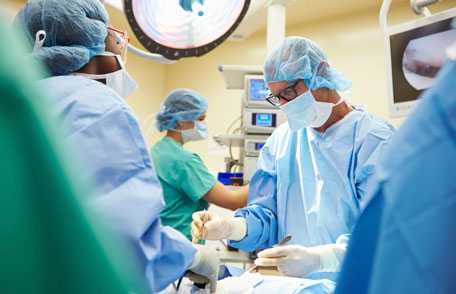What You Should Know Before Your Surgery
 Protect yourself and your loved ones from infections related to surgery.
Protect yourself and your loved ones from infections related to surgery.
Having any type of surgery can be stressful. You might be asking yourself: What is the recovery process? How long will I be out of work? What do I do after leaving the hospital or surgery center?
An important question you might not have thought of is: How do I avoid getting a surgical site infection (SSI)?
A SSI is an infection patients can get during or after surgery. SSIs can happen on any part of the body where surgery takes place and can sometimes involve only the skin. Other SSIs are more serious and can involve tissues under the skin, organs, or implanted material.
These infections can make recovery from surgery more difficult because they can cause additional complications, stress, and medical cost. It is important that healthcare providers, patients and loved ones work together to prevent these infections.
Patients should expect safe healthcare everywhere care is given, including doctor’s offices, surgery centers, physical/occupational clinics, and other outpatient care practices.
Healthcare providers can use tools and guidance to prevent infections during patient care.
What can healthcare providers do to ensure that the surgical site is clean?
- Clean their hands and arms up to the elbows with an antiseptic agent just before the surgery.
- Wear hair covers, masks, gowns, and gloves during surgery to keep the surgery area clean.
- Give you antibiotics before surgery starts when indicated.
- Clean the skin at the surgery site with a special soap that kills germs.

Before your surgery, discuss other health problems with your doctor.

Make sure you know who to contact if you have questions or problems after you get home.
How can you and your loved ones prevent surgical site infections?
- Before your surgery, discuss other health problems, such as diabetes, with your doctor. These issues can affect your surgery and your treatment.
- Quit smoking. Patients who smoke get more infections.
- Follow your doctor’s instructions for cleaning your skin before your surgery. For example, if your doctor recommends using a special soap before surgery, make sure you do so.
- Avoid shaving near where you will have surgery. Shaving with a razor can irritate your skin and make it easier to develop an infection. If someone tries to shave you before surgery, ask why this is necessary.
After surgery, be sure to follow the recommendations below to protect against surgical site infection.
- Ask your provider to clean their hands before they examine you or check your wound.
- Do not allow visitors to touch the surgical wound or dressings.
- Ask family and friends to clean their hands before and after visiting you.
- Make sure you understand how to care for your wound before you leave the medical facility.
- Always clean your hands before and after caring for your wound.
- Make sure you know who to contact if you have questions or problems after you get home.
- If you have any symptoms of an infection, such as redness and pain at the surgery site, drainage, or fever, call your doctor immediately.
More Information
More Information
Surgical Site Infection Resources
Clinician Resources
- Guide to Infection Prevention for Outpatient Settings: Minimum Expectations for Safe Care
- Top CDC Recommendations to Prevent Healthcare-Associated Infections
- Dr. Melissa Schaefer’s Expert Video Commentary on Guide to Infection Prevention
- CDC Unsafe Injection Practices: Outbreaks, Incidents, and Root Causes continuing medical education course on Medscape
- Journal of the American Medical Association (JAMA): Infection Control Assessment of Ambulatory Surgical Centers
- Ambulatory Surgical Center: Infection Control Surveyor Worksheet [667 KB]
- Healthcare Infection Control Practices Advisory Committee (HICPAC) Guidelines
- Page last reviewed: March 14, 2016
- Page last updated: March 14, 2016
- Content source:
- National Center for Emerging and Zoonotic Infectious Diseases, Division of Healthcare Quality Promotion
- Page maintained by: Office of the Associate Director for Communication, Digital Media Branch, Division of Public Affairs




 ShareCompartir
ShareCompartir